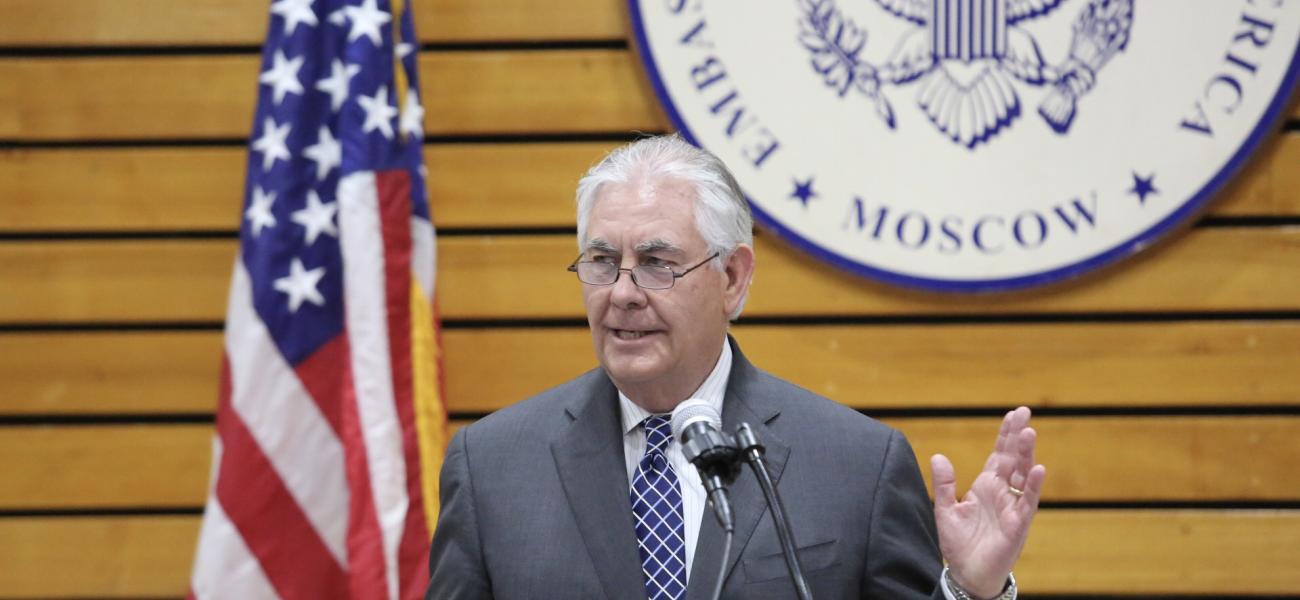
Tillerson in Moscow: A Welcome Return to Reality
Secretary of State Rex Tillerson's visit to Moscow should mark the end of fantastical assumptions in both the United States and Russia and the start of a sober, pragmatic process. For the last several months, we have been treated either to irrational exuberance in Russian circles that the arrival of Donald Trump in the Oval Office would portend a glorious new era of friendship and cooperation, or heated conspiracy theories about Trump being the Kremlin's Manchurian candidate preparing to sell out American interests. After the administration's decision last week to undertake a limited cruise missile strike to punish the Syrian government for its apparent use of chemical weapons, the pendulum swung to the other side with pundits on both sides predicting an immediate worsening of relations or the prospect for immediate military conflict.
Matters in the days prior to Tillerson's arrival were complicated by contradictory statements coming from different members of the administration about likely U.S. policies in Syria and towards Russia, and in response it appeared that the important first meeting between Tillerson and Russian President Vladimir Putin—designed to formally set up the structures for U.S.-Russia interaction—would not take place.
Yet there were no dramatic outbursts or the diplomatic equivalents of slamming doors, and the Putin-Tillerson meeting did get back on the schedule right at the end of Tillerson's visit. The foundation has been laid for setting U.S.-Russia relations back on course.
First, Tillerson seems to have provided the Russians with a complete assessment of the limitations under which the Trump administration is operating. From the reputed Russian interference in the 2016 election campaign to continued support for Bashar al-Assad, the Kremlin's choices create difficulties for those in the U.S. establishment promoting engagement with Russia. It is, of course, Russia's sovereign right to pursue its own foreign and domestic policies, but Tillerson helped to bring some needed clarity of how those choices impact the maneuvering room that is available to the administration.
Second, Tillerson helped to clarify how the Russian establishment can cut through the noise and chatter to determine the president's position. It helped, certainly, that Trump himself has realized that staying aloof and uncommunicative means that others will be prepared to substitute their views and preferences for his own. After a week of hearing different and contradictory messages, Tillerson was able to lay out for his Russian interlocutors that the administration is not on the verge of directly intervening in Syria for the purpose of regime change.
Many commentators are asserting that the first meeting should be characterized as a failure for the lack of any substantive agreements (say on Ukraine or Syria) and no decision on a planned Putin-Trump face-to-face summit. Instead, I would focus on the effort to create working groups and establish clear lines of communication. Trump has noted that he and Putin are "not on the same wavelength" and don't see the world in the same way. That was a very critical admission because before there can be any substantive changes in U.S.-Russia relations, both sides need to be working off the same set of assumptions and understandings. The run-up to the Tillerson visit made it clear that this is presently not the case. It is therefore a waste of time to announce a summit meeting when there is no agreed-upon agenda or set of deliverables that a Putin-Trump meeting would be expected to reach.
By all accounts, the discussions in Moscow were frank—and no effort was made to shade disagreements. Having an honest conversation is more important at this stage than wanting to "play nice" for the cameras. Trump has declared that the U.S.-Russia relationship is at a low point. Putin agrees. Tillerson leaves Moscow not having magically patched things up in a 48-hour whirlwind stop—but instead has committed to seeing through a substantive dialogue that is designed to expose and probe the sources of disagreements and discontinuities. If both sides commit to seeing that dialogue through, U.S.-Russia relations may, for the first time in a while, be rooted in a firm foundation.
Nikolas K. Gvosdev
Nikolas K. Gvosdev is professor of national security affairs at the U.S. Naval War College. The views expressed here are his own.
Photo from the U.S. State Department.
The opinions expressed in this commentary are solely those of the author.
